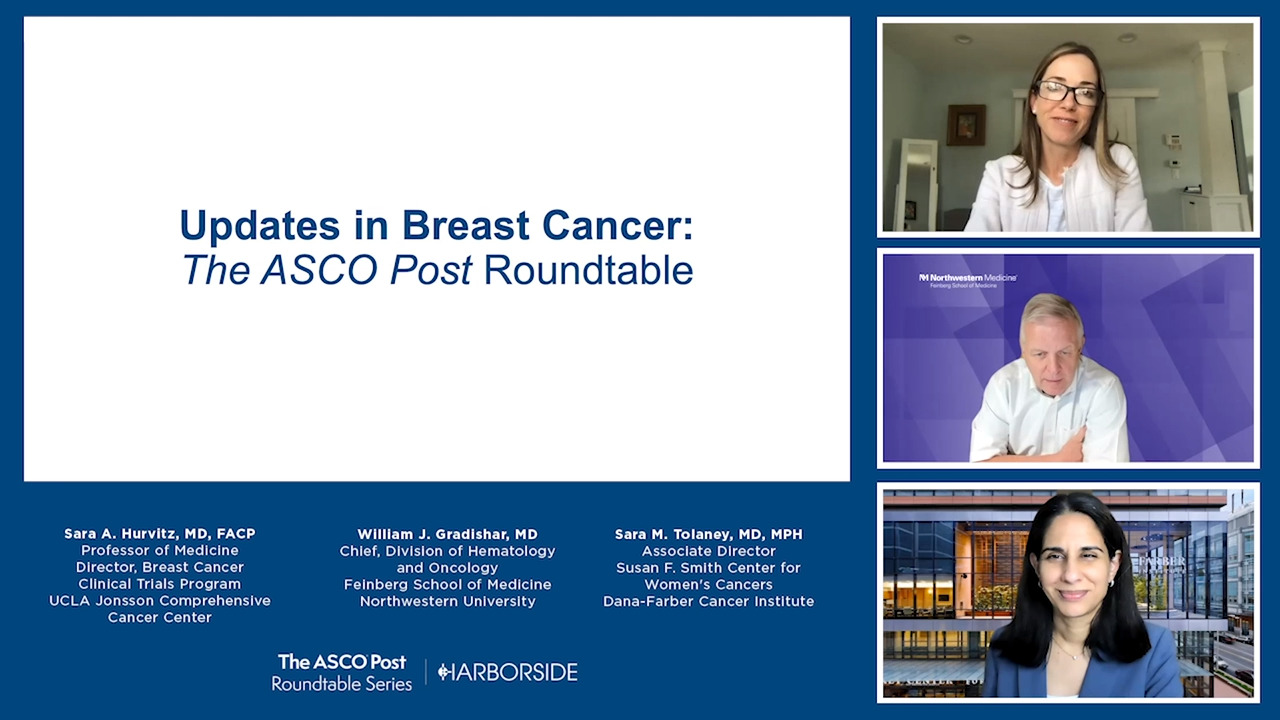Newly Diagnosed HER2-Negative Metastatic Breast Cancer
In this video, Drs. Sara A. Hurvitz, William J. Gradishar, and Sara M. Tolaney discuss current treatment options for newly diagnosed HER2-negative metastatic breast cancer. Dr. Hurvitz presents the case of a 49-year-old perimenopausal Latina woman with intermediate-grade T2N1 left breast cancer that is estrogen receptor/progesterone receptor–positive and HER2-negative, with bone and liver metastases. The faculty walk through how they would choose between chemotherapy and endocrine-based options for this patient and discuss recent data on CDK4/6 inhibitors showing improved outcomes in the first-line setting.
Breast Cancer in 2030: Predictions From a Breast Cancer Luminary
According to George W. Sledge, Jr, MD, FASCO, Professor of Medicine in the Division of Oncology at Stanford University Medical Center, by the beginning of the next decade, clinicians will be aided by the use of artificial intelligence (AI) in many facets of care and by the approval of a wave of new ...
MINDACT Trial Shows ‘Excellent’ Outcomes in Ultra-Low–Risk Breast Cancer
Patients with ultra-low–risk breast cancer, as classified by the MammaPrint 70-gene assay, had “excellent” long-term outcomes regardless of clinical risk or receipt of adjuvant therapy, a new analysis of the MINDACT trial has shown.1 In a separate study, a retrospective analysis of the National...
I’m Alive by Sheer Force of Will—and a Lot of Luck
From the moment I felt a searing pain go through my right breast, I had a premonition that something was very wrong. Although I couldn’t feel anything unusual when I did a breast self-exam, I made an appointment with my gynecologist for a more thorough clinical breast exam and a mammogram. Because...
Factoring Fertility Preservation Into Breast Cancer Treatment
Breast cancer is the most commonly diagnosed cancer in women of reproductive age. Approximately 10% of breast cancers are diagnosed in this age group.1 Young age at diagnosis is an adverse prognostic factor, and most young women will be offered chemotherapy and/or endocrine therapy, both of which ...
FDA Pipeline: Designations for Therapies in Myelodysplastic Syndromes and Triple-Negative Breast Cancer
Recently, the U.S. Food and Drug Administration (FDA) granted special designation status to treatments for myelodysplastic syndromes and advanced triple-negative breast cancer. Breakthrough Therapy Designation for Venetoclax in Combination With Azacitidine for Myelodysplastic Syndromes Venetoclax...
Outcomes in Patients With HER2-Low–Positive Breast Cancer Participating in Neoadjuvant Clinical Trials
In a pooled analysis of individual patient data from breast cancer neoadjuvant clinical trials reported in The Lancet Oncology, Carsten Denkert, MD, and colleagues found that pathologic complete response and survival rates for patients with HER2-low–positive vs HER2-zero tumors differed according...
Is There a Disease-Free Survival Benefit With Adjuvant Celecoxib in HER2-Negative Breast Cancer?
In the phase III REACT trial reported in JAMA Oncology, R. Charles Coombes, MD, PhD, and colleagues found no disease-free survival benefit with the addition of 2 years of adjuvant celecoxib vs placebo to conventional adjuvant treatment in patients with HER2-negative breast cancer. Study Details...
Efficacy of Dendritic Cell Vaccines Plus Standard Therapy for Breast Cancer
A report published by Oba et al in the Journal for ImmunoTherapy of Cancer shares new data on combining standard treatment for breast cancer with a particular form of cancer immunotherapy—dendritic cell vaccines. The study is reportedly the first to demonstrate that in situ dendritic cell vaccines...
Breast-Conserving Surgery Plus Radiotherapy May Yield Better Survival Than Mastectomy With or Without Radiotherapy
In a Swedish cohort study reported in JAMA Surgery, de Boniface et al found that breast-conserving surgery plus radiation therapy for women with breast cancer was associated with better survival vs mastectomy with or without radiotherapy in analysis adjusting for comorbidities and socioeconomic...
Study Estimates Costs Associated With Metastatic Breast Cancer Treatment May Increase Substantially in the Coming Decade
A study from the UNC Center for Health Promotion and Disease Prevention (HPDP) estimates that annual costs associated with metastatic breast cancer treatment among women in the United States will total $152.4 billion in 2030—nearly two and a half times the estimate for 2015 costs—due to an increase ...
Pregnancy Outcomes and Maternal Complications Among Survivors of Breast Cancer
In a systematic review and meta-analysis reported in the Journal of Clinical Oncology, Matteo Lambertini, MD, PhD, and colleagues found that breast cancer survivors were less likely to have subsequent pregnancy vs the general population and more likely to have preterm birth. However, no reduction...
Initial Pandemic-Related Disruptions in Breast Cancer Care May Result in Increased Mortality Over the Next Decade
During the early months of the COVID-19 pandemic in 2020, elective medical procedures, including screenings for breast cancer, were curtailed to prioritize urgent medical needs and reduce the risk of spreading the coronavirus in health-care settings. A study showed that, as of May 2020, preventive...
Real-World Survival Outcomes With Pertuzumab Plus T-DM1 for HER2-Positive Metastatic Breast Cancer
In a Canadian population-based retrospective cohort study reported in JAMA Oncology, Ethier et al identified real-world survival outcomes among women receiving pertuzumab and trastuzumab emtansine (T-DM1) for stage IV HER2-positive breast cancer, observing that outcomes appeared to be poorer than...
Terry P. Mamounas, MD, MPH, on Breast Cancer: Extended Aromatase Inhibitor Therapy
Terry P. Mamounas, MD, MPH, of the University of Florida Health Cancer Center, discusses results from the NRG Oncology/NSABP B-42 study, which examined the Breast Cancer Index and its ability to predict whether extended treatment with letrozole benefits patients with hormone receptor–positive breast cancer (Abstract 501).
Evandro de Azambuja, MD, PhD, Discusses the Short-HER Trial
Invited discussant of the Short-HER trial, Evandro de Azambuja, MD, PhD, Head of the Medical Support Team at the Institut Jules Bordet, Brussels, acknowledged the good outcomes in low- and intermediate-risk patients treated with either a short or long duration of trastuzumab but said 1 year of the...
Long-Term Analysis of Short-HER Trial of Adjuvant Trastuzumab
Long-term analysis of the Short-HER trial showed that 9 weeks of adjuvant trastuzumab conveyed benefits comparable to a 1-year course in patients with early HER2-positive breast cancer deemed to be at low or intermediate risk for recurrence. High-risk patients, however, derived considerably more...
Melinda L. Telli, MD, on Breast Cancer: Neoadjuvant Talazoparib for Early HER2-Negative Disease
Melinda L. Telli, MD, of Stanford University, discusses results of a phase II study on neoadjuvant talazoparib in germline BRCA1/2 mutation–positive, early HER2-negative breast cancer. In this setting, talazoparib monotherapy was active and yielded pathologic complete response rates comparable to those observed with combination anthracycline and taxane-based chemotherapy regimens (Abstract 505).
Reflections on Evolution of Breast Cancer Care in India Over the Past 4 Decades
India has witnessed a major paradigm shift in the field of breast cancer and its management over the past 4 decades. The discipline of medical oncology has evolved exponentially over this period—a growth that few other scientific disciplines have experienced. Interventions at the individual,...
Expert Point of View: Melinda Telli, MD
EA1131 study discussant, Melinda Telli, MD, Associate Professor of Medicine at Stanford University, Director of the Breast Cancer Program at the Stanford Cancer Institute, and Associate Director of the Stanford Women’s Cancer Center, commented: “At this point,1 capecitabine remains preferred as...
EA1131 Trial: Platinum Not Equal to Capecitabine for Residual Disease in Triple-Negative Breast Cancer
In patients with triple-negative breast cancer who have residual disease after neoadjuvant chemotherapy, adjuvant capecitabine remains the standard of care. In the multicenter randomized noninferiority EA1131 trial, which included primarily basal tumors, noninferiority of adjuvant platinum over...
ADAPT Trial: ‘Excellent’ Outcomes Reported With Neoadjuvant Dual HER2 Therapy in Breast Cancer
The first overall survival analysis of the WGS-ADAPT HER2+/HR– study, which evaluated neoadjuvant therapy in patients with hormone receptor–negative, HER2-positive disease, showed that treatment with pertuzumab and trastuzumab plus paclitaxel—or with the chemotherapy-free regimen of...
Disease Risk Associated With Protein-Truncating and Rare Missense Variants in Breast Cancer Risk Genes
In a study reported in TheNew England Journal of Medicine, Leila Dorling, PhD, of the Centre for Cancer Genetic Epidemiology, Departments of Public Health and Primary Care, University of Cambridge, United Kingdom, and colleagues in the international Breast Cancer Association Consortium (BCAC),...
Is Chemotherapy Associated With Complications or Poorer Outcomes Among Women Undergoing Immediate Breast Reconstruction?
In a cohort study reported in JAMA Surgery, Hart et al found that treatment with either neoadjuvant or adjuvant chemotherapy was not associated with an increased risk of complications or poorer patient-reported outcomes in women undergoing mastectomy for breast cancer with immediate breast...
Study Finds Reduced Treatment Delays for Patients With Breast Cancer May Improve Survival Rates
Research published by Pratt et al in Annals of Surgical Oncology showed an increase in survival rates when treatment options—surgery, chemotherapy, and radiation—are completed within 38 weeks from the time of diagnosis for patients with breast cancer. Optimal Treatment Duration The observational...
Personalizing Treatment of Early HER2-Positive Breast Cancer
With several pivotal trials providing evidence for the escalation and de-escalation of anti-HER2 therapy in certain early breast cancer scenarios, personalized treatment is possible. How can clinicians optimize treatment by applying the studies’ findings? Debu Tripathy, MD, Professor and Chair of...
Study Examines Impact of COVID-19 on Breast and Cervical Cancer Screening Programs
The total number of cancer screening tests received by women through the Centers for Disease Control and Prevention’s (CDC) National Breast and Cervical Cancer Early Detection Program (Early Detection Program) declined by 87% for breast cancer and 84% for cervical cancer during April 2020 as...
Outcomes With 5 vs 2 Years of Zoledronate Treatment Following Adjuvant Chemotherapy in Early Breast Cancer
In the German phase III SUCCESS A trial reported in JAMA Oncology, Friedl et al found no differences in disease-free or overall survival with 5 vs 2 years of zoledronate treatment following adjuvant chemotherapy for early breast cancer. Study Details In the multicenter, open-label, 2 × 2 factorial...
Beyond CDK4/6 Inhibitors in Metastatic Breast Cancer: What’s Next?
Because of their well-established efficacy, inhibitors of cyclin-dependent kinases 4 and 6 (CDK4/6) are the standard of care in the treatment of hormone receptor–positive, HER2-negative metastatic breast cancer. The question now is this: after disease progresses on a CDK4/6 inhibitor and endocrine...
Risk Factors for Early Discontinuation of Adjuvant Endocrine Therapy for Breast Cancer
In a post hoc analysis from the phase III TAILORx trial reported in JAMA Oncology, Yanez et al identified factors that may be associated with an increased and decreased likelihood of early discontinuation of adjuvant endocrine therapy for breast cancer. Study Details The TAILORx trial, conducted...
Improving Screening of Dense Breasts With Newer MRI Technologies
Women with dense breasts are increasingly being screened with magnetic resonance imaging (MRI), which is clearly the best way to detect small cancers in this population, according to Elizabeth Morris, MD, FACR, FSBI, FISMRM, Professor and Chair of the Department of Radiology at the University of...
Breast Cancer Has Taught Me Many Life Lessons
In 2016, 2 years before I was diagnosed with stage III estrogen and progesterone receptor–positive, HER2-negative, invasive ductal carcinoma in situ in my left breast, I had felt a mass in my right breast that turned out to be a benign fibroid. When I felt a mass in my left breast one morning while ...
OlympiA Trial: Adjuvant Olaparib Extends Disease-Free Survival in BRCA-Mutated Early Breast Cancer
Adjuvant therapy with the PARP inhibitor olaparib for 1 year extended disease-free survival in patients with high-risk early-stage HER2-negative breast cancer with BRCA1/2 germline (inherited) mutations, according to a prespecified interim analysis of the phase III OlympiA trial presented at the...
Priya Rastogi, MD, on Breast Cancer: Predicting the Benefit of Extended Letrozole Therapy
Priya Rastogi, MD, of the University of Pittsburgh, discusses results from the NRG Oncology/NSABP B-42 trial, which evaluated the utility of the 70-gene MammaPrint assay in predicting the benefit of extended letrozole therapy in patients who had completed 5 years of adjuvant endocrine therapy (Abstract 502).
Testing of Lymph Nodes for Breast Cancer Recurrence After Neoadjuvant Chemotherapy
A study published by Sharp et al in The Breast Journal suggests that some patients with breast cancer may be able to forgo certain testing procedures after neoadjuvant chemotherapy without increasing their risk of cancer recurrence. Prior studies on detecting whether breast cancer has spread to...
Sibylle Loibl, MD, PhD, on Triple-Negative Breast Cancer: Improving Long-Term Outcomes With Durvalumab
Sibylle Loibl, MD, PhD, of the German Breast Group, discusses results from the phase III GeparNUEVO study, which investigated neoadjuvant durvalumab in addition to anthracycline/taxane-based neoadjuvant chemotherapy in patients with early triple-negative breast cancer (Abstract 506).
Survivors of Early-Stage Breast Cancer Face Broad Range of Symptoms and Concerns
Patients with early-stage breast cancer may be at low risk of dying of their disease, but they experience a high burden of physical and psychological symptoms long after their treatment has ended, according to data presented during the 2021 American Society of Breast Surgeons Annual Meeting.1...
Effect of Polygenic Risk Score on Estimated Breast Cancer Risk Among Carriers of Pathogenic Variants in Predisposition Genes
In a study reported in the Journal of Clinical Oncology, Gao et al found that use of a polygenic risk score (PRS) modified the estimated risk of breast cancer among both carriers and noncarriers of established pathogenic variants in breast cancer predisposition genes. Study Details The study...
ASCO Releases Rapid Guideline Recommendation Update for Patients With High-Risk, HER2-Negative, Germline BRCA–Mutated Breast Cancer
A new ASCO guideline update recommends offering 1 year of adjuvant olaparib to patients with high-risk, early-stage, HER2-negative breast cancer and germline BRCA mutations after completion of (neo)adjuvant chemotherapy and local treatment, including radiation. The recommendations update the 2020...
De-escalating Surgery for Women With Breast Cancer
From routine axillary lymph node dissection to sentinel lymph node surgery, the use of axillary surgery continues to evolve in breast cancer. Recently, surgical oncologists have begun to consider avoiding axillary surgery completely in patients with a low risk of node-positive disease as well as in ...
Geoffrey J. Lindeman, MBBS, PhD, on Breast Cancer: Venetoclax and Fulvestrant in ER-Positive, HER2-Negative Disease
Geoffrey J. Lindeman, MBBS, PhD, of Peter MacCallum Cancer Centre, discusses results from the phase II VERONICA study, which compared venetoclax plus fulvestrant with fulvestrant alone in women with estrogen receptor–positive, HER2-negative, locally advanced or metastatic breast cancer who experienced disease recurrence or progression during or after treatment with CDK4/6 inhibitor therapy (Abstract 1004).
Nadia Harbeck, MD, PhD, on Luminal Breast Cancer: Prognostic Impact of Recurrence Score, Endocrine Response, and Other Factors
Nadia Harbeck, MD, PhD, of Ludwig Maximilian University of Munich, discusses first phase III results from a prospective high-risk cohort of patients with luminal breast cancer, which showed a good prognosis in some women with more than four positive lymph nodes and low recurrence scores. The study also showed that a lower postendocrine Ki67 index and limited tumor burden may be promising criteria for chemotherapy de-escalation strategies, even in patients with high recurrence scores (Abstract 504).
Adjuvant Platinum vs Capecitabine in Patients With Basal Subtype Triple-Negative Breast Cancer and Residual Disease After Neoadjuvant Chemotherapy
As reported in the Journal of Clinical Oncology and during the 2021 ASCO Annual Meeting by Ingrid A. Mayer, MD, and colleagues, the phase III ECOG-ACRIN EA1131 trial investigated the use of adjuvant platinum vs capecitabine in patients with basal subtype triple-negative breast cancer and residual...
Cryoablation in Low-Risk Breast Cancers: Minimally Invasive Procedure With Minimal Risk
Cryoablation is emerging as a new alternative to surgical excision for smaller early-stage, low-risk breast cancers in appropriately selected patient populations, according to data presented during the 2021 American Society of Breast Surgeons Annual Meeting.1 Early 3-year results of the multicenter ...
Adjuvant Trastuzumab Emtansine vs Paclitaxel/Trastuzumab in Stage I HER2-Positive Breast Cancer
In the phase II ATEMPT trial reported in the Journal of Clinical Oncology, Sara M. Tolaney, MD, MPH, and colleagues found that adjuvant trastuzumab emtansine (T-DM1) resulted in “excellent” invasive disease–free survival but did not reduce clinically relevant toxicity compared with...
Real-World Survival Outcomes With Targeted Therapy for Intracranial Metastatic Disease
In a retrospective cohort study reported in JAMA Oncology, Erickson et al found that real-world use of targeted therapy after diagnosis of intracranial metastatic disease was associated with improved overall survival vs no use of targeted therapy in patients with HER2-positive breast cancer,...
Breast Cancer Risk Prediction Model for Childhood Cancer Survivors Who Received Chest Radiation
In an analysis from the Childhood Cancer Survivor Study (CCSS) and the Dutch Hodgkin Late Effects and LATER cohorts reported in the Journal of Clinical Oncology, Moskowitz et al developed a model for predicting the risk of breast cancer among childhood cancer survivors treated with chest...
Nadia Harbeck, MD, PhD, on Early Breast Cancer: Benefit of a De-escalated Regimen
Nadia Harbeck, MD, PhD, of Ludwig Maximilian University of Munich, discusses results from the ADAPT HR–/HER2+ trial, which showed, for the first time, improved pathologic complete response and survival in patients with early breast cancer who were treated weekly with a de-escalated 12-week regimen of neoadjuvant paclitaxel plus pertuzumab and trastuzumab (Abstract 503).
Does Vitamin D Supplementation Improve Prognosis for Patients With Breast Cancer?
A research team has found that sufficient vitamin D levels at the time of diagnosis may be associated with improved outcomes among people with breast cancer. These findings were presented by Yao et al during the 2021 ASCO Annual Meeting (Abstract 10510). These findings are based on Kaiser...
ADAPT: Survival Outcomes After Neoadjuvant Dual HER2 Therapy for HR-Negative, HER2-Positive Breast Cancer
The first overall survival analysis of the WSG-ADAPT HR-/HER2+ study, which evaluated neoadjuvant therapy in patients with hormone receptor (HR)-negative, HER2-positive breast cancer, showed that treatment with pertuzumab and trastuzumab plus paclitaxel—or the chemotherapy-free regimen of...








